|
|
|
Sort Order |
|
|
|
Items / Page
|
|
|
|
|
|
|
| Srl | Item |
| 1 |
ID:
190422
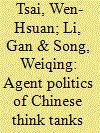

|
|
|
|
|
| Summary/Abstract |
This paper analyzes the relationship between the Chinese government and domestic think tanks. Chinese think tanks in the cultural sector have a strong demand-side orientation; that is, they closely follow the instructions of the Chinese Communist Party (CCP) in their stand on culture-related policies. Since 2018, the CCP has strengthened its control over the propaganda and cultural affairs, using think tanks to this end. Think tanks act as dual agents, maximizing the benefits offered by their two principals – the party government and private businesses, while prioritizing the former. The paper examines the development of the Putuo Island Park in Zhejiang Province and the Cultural Industry Research Institute, the key cultural industry think tank in this province. While upholding Xi Jinping’s aspiration of developing China into a “cultural great power,” cultural think tanks’ main function is to endorse government policies and guide businesses to support those policies when necessary. The CCP under Xi has intensified its manipulation of think tanks to reinforce its control over ideology and the socialist market economy, resulting in a more complex relationship between the state and think tanks.
|
|
|
|
|
|
|
|
|
|
|
|
|
|
|
|
| 2 |
ID:
142225
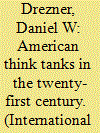

|
|
|
|
|
| Summary/Abstract |
Think tanks have been a part of the United States’ foreign policy establishment for more than a century. They have played a significant role at key junctures in US foreign policy. Two inflection points, however, have dramatically altered the think tank landscape in the last 15 years. The 11 September 2001 terrorist attacks caused these organizations to dramatically expand their staff and overhead, as the demand for their services increased. The 2008 financial crisis subsequently left many of these same think tanks financially overextended. This circumstance forced these organizations to seek out more unconventional funding arrangements, imposing new constraints at the exact moment that their competitive environment intensified. In the twenty-first century, US foreign policy think tanks will maintain their relevancy by moving beyond what made them relevant in the last century.
|
|
|
|
|
|
|
|
|
|
|
|
|
|
|
|
| 3 |
ID:
129685
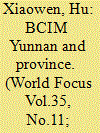

|
|
|
|
|
| Publication |
2014.
|
| Summary/Abstract |
BCIM (Bangladesh, China, India and Myanmar) forum for regional cooperation was jointly initiated by think tanks of China and India at the end of 1990s. on August of 1999, the first conference was held in Kunming and announced Kunming initiative, which opening the exploration of BCIM forums were convened persistently and alternately from 1999-2013 among four countries.
|
|
|
|
|
|
|
|
|
|
|
|
|
|
|
|
| 4 |
ID:
142518
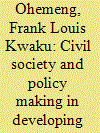

|
|
|
|
|
| Summary/Abstract |
Not long ago, the number of think tanks in Ghana began to increase steadily. These organizations have now carved out a niche as repositories of ideas for government to tap when formulating and implementing good policies for development. Unfortunately, while their role in the policy making process is well accepted, whether they actually have a substantial impact on policy outcomes is as yet undetermined. In this paper, we will examine the impact of think tanks on policy outcomes in Ghana by looking at two major policy areas where policies have been initiated either by these institutions or by government itself.
|
|
|
|
|
|
|
|
|
|
|
|
|
|
|
|
| 5 |
ID:
159554
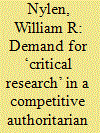

|
|
|
|
|
| Summary/Abstract |
Think tanks in competitive authoritarian regimes are implicitly if not explicitly oppositional, producing and disseminating research critical of government policies and elite behaviour. Existing literature asks how and why such think tanks emerge and survive, and if they exercise real influence. This paper asks if anyone actually reads their critical research. Focusing on two cases in Mozambique – the Instituto de Estudos Sociais e Económicos (IESE) and the Centro de Integridade Pública (CIP) – three original data sets are examined: (1) citations in the bibliographies of end-of-programme theses of undergraduates in the political science, public administration, economics, and/or sociology departments of two of Mozambique's most important universities; (2) websites and Facebook activities – visits, downloads, etc.; and (3) citations in academic journals that publish on Africa. Findings show evolving demand for these think tanks’ research, suggesting their growing status within Mozambique and, by implication, within civil societies of similar competitive authoritarian regimes.
|
|
|
|
|
|
|
|
|
|
|
|
|
|
|
|
| 6 |
ID:
158497
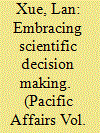

|
|
|
|
|
| Summary/Abstract |
The literature has traditionally regarded the rise and fall of Chinese think tanks as a product of the relaxation or tightening of control over the ideological domain by the Communist Party of China (CPC). However, since 2013, think tanks in China have continued to prosper in spite of the general perception that the ideological domain became more restricted. This article explains the reasons for, and consequences of, the rise of key think-tank policies and the construction of “New-Type Think Tanks with Chinese Characteristics” (NTTTCC). We argue that the success of Chinese think tanks has been driven primarily by greater official recognition of their value, due to increasingly complex domestic and international problems stemming from a fragmented decision-making system. We further argue that the rise of think-tank policies in China can be attributed to a long history of interactions among multiple internal and external actors, which in turn, opened the “window of opportunity” for a new policy agenda. Consequently, by late 2015, the new policies led to the selection of twenty-five “pilot high-end think tanks” and the establishment of the management system of think tanks in China.
|
|
|
|
|
|
|
|
|
|
|
|
|
|
|
|
| 7 |
ID:
118220
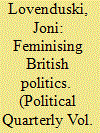

|
|
|
| 8 |
ID:
107984
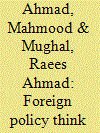

|
|
|
|
|
| Publication |
2011.
|
| Summary/Abstract |
In foreign policy realm, Chinese think tanks are day by day getting more influential, complex, and numerous. This article is an effort to trace the nature, scope, typology, and influence of policy advice institutions in China against the time blocks of past, present, and future. After defining the factors working behind the present growth of think tanks in China, the present era is also substantiated for all non-Chinese actors as the unprecedented time of access and interaction since 1949.
|
|
|
|
|
|
|
|
|
|
|
|
|
|
|
|
| 9 |
ID:
142222
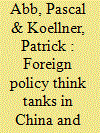

|
|
|
|
|
| Summary/Abstract |
The role of foreign policy think tanks (FPTTs) in policy-making has received substantial scholarly attention, with most studies focusing on US-based organizations. In this article, we seek to address this spatial bias by discussing the development and roles of FPTTs in two East Asian countries, China and Japan. China today hosts the second-largest think tank scene in the world, and many FPTTs have received influxes of funding and increased the academic qualifications of their staffers in recent years. Japan also hosts a sizable array of think tanks, but many of them operate on a for-profit basis and do not focus on public policy issues; Japan has very few genuine FPTTs. In both countries, FPTTs are in many ways linked to the government. While they seek to inform and influence foreign and security policy as well as public discourse on international affairs, they usually do not act as agenda setters. By examining the recent case of constitutional reinterpretation in Japan, which aimed to enable collective self-defence, we show how Japanese public intellectuals, including think tankers, helped to legitimize this controversial move and how Chinese FPTTs reacted publicly by providing media commentary in support of the official government line.
|
|
|
|
|
|
|
|
|
|
|
|
|
|
|
|
| 10 |
ID:
158632
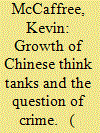

|
|
|
|
|
| Summary/Abstract |
This paper reviews several of the key issues that underlie the development and expansion of think tanks in China from both a domestic and international perspective. Substantively, the review focuses on the need to develop criminological think tanks in China due to the well-documented relationship between rapid urbanization, social displacement, and crime. Though work on urbanization, social disorganization, and crime has existed for over half a decade in Western criminology, it suffers from a lack of research outside of the Western and usually more specifically American, cultural context. To advance this call for research, the paper identifies 14 generative research programs in the areas of the Routine Activities Theory, Social Bonds Theory, and Institutional Anomie Theory pursuable by Chinese criminological think tanks. The paper concludes with a brief discussion of some potential barriers to the successful production and dissemination of criminological research in China.
|
|
|
|
|
|
|
|
|
|
|
|
|
|
|
|
| 11 |
ID:
158498
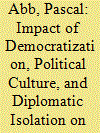

|
|
|
|
|
| Summary/Abstract |
Taiwan’s landscape of think tanks, despite having emerged during a time of Leninist one-party governance and state-led economic development not unlike that in Mainland China, is today marked by a substantial agency in conducting both research and advocacy. This sets them apart from their counterparts on the mainland. We ask how this development was shaped by Taiwan’s evolution as a political entity, especially its experience of gradual political liberalization and eventual full democratization by the mid-1990s. In its wake, multiparty competition, factionalism, the emergence of a vigorous civil society, and individual interest groups created an environment in which think-tank services were sought by many competing actors, offering a wide array of funding opportunities for policy research. Additionally, a political culture that stresses expertise and the need to conduct unofficial diplomacy often gave think tanks a privileged position within the system, and they served as key agents in conducting the kind of informal diplomacy made necessary by Taiwan’s loss of diplomatic recognition from the 1970s onwards.
We further offer an overview of Taiwan’s think-tank landscape, describing major groups (or types) of institutes and briefly portraying especially prominent cases within them. Finally, we provide two detailed case studies to show how these institutes operate in practice, and how the need for unofficial diplomacy and a recent government change have shaped their activities.
|
|
|
|
|
|
|
|
|
|
|
|
|
|
|
|
| 12 |
ID:
152546
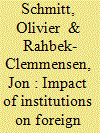

|
|
|
|
|
| Summary/Abstract |
Even though France is an active player on the world stage, its foreign and security think tank milieu is smaller than that of similar powers, most notably the United Kingdom. Comparing French think tanks with those in Denmark illustrates how French institutional structures constrain think tank activities. France’s political tradition of centralisation, its non-academic civil service education, and separation of academia and administration create an environment in which think tanks are underfunded and walk a fine line between an over-controlling administration and a suspicious academia. Some French think tanks perform well in spite of these structures, which indicates that they could flourish and compete at the highest international level if given better structural conditions.
|
|
|
|
|
|
|
|
|
|
|
|
|
|
|
|
| 13 |
ID:
142223
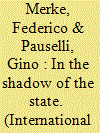

|
|
|
|
|
| Summary/Abstract |
This paper analyzes the role of think tanks as members of civil society in Latin America. Our goal is to present an initial conceptualization and measurement of the role think tanks play in the foreign policy sub-subsystem. We focus on three of the most influential think tanks in the region: CARI (Argentina), CEBRI (Brazil), and COMEXI (Mexico). This paper suggests that the state’s characteristics and the character of its civil society determine the type and strength of its think tanks. This paper also considers the challenges that think tanks face in Argentina, Brazil, and Mexico more generally by comparing each chosen think tank’s board, public activities, presence in local media and social media, and publications. We conclude that there have yet to be significant incentives and resources available for thinks tanks in Argentina, Brazil, and Mexico to grow and, thus, Latin American think tanks’ activities typically follow their governments’ agendas.
|
|
|
|
|
|
|
|
|
|
|
|
|
|
|
|
| 14 |
ID:
088393
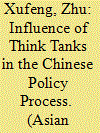

|
|
|
|
|
| Publication |
2009.
|
| Summary/Abstract |
This article argues that expert knowledge, governmental linkage, and personal ties are the factors that determine think tanks' influence in the Chinese policy process. Moreover, different types of think tanks exert influence through different mechanisms. Empirical data are from a 2004 nationwide survey of 301 of China's think tanks.
|
|
|
|
|
|
|
|
|
|
|
|
|
|
|
|
| 15 |
ID:
106460
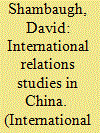

|
|
|
|
|
| Publication |
2011.
|
| Summary/Abstract |
International relations (IR) studies in China have developed considerably over the past three decades. The field is now well established with 49 degree-granting institutions, as well as a series of 'think tanks' that produce policy-related analyses of international issues. Recent survey research of publication trends in the field reveals a significant new diversity of research subject areas, with an increased emphasis on topics associated with Western 'liberal' IR theory and international political economy, while at the same time revealing a tenacity of 'realist' topics such as major power relations. While the quantitative dimensions of the field have grown dramatically - institutions, faculty, publications - the overall quality of research remains very uneven across China and generally weak when compared internationally. This article surveys the historical development of the field, summarizes the current state of the field, and identifies challenges and opportunities for future development.
|
|
|
|
|
|
|
|
|
|
|
|
|
|
|
|
| 16 |
ID:
158499
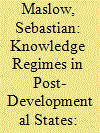

|
|
|
|
|
| Summary/Abstract |
Tracing the mechanisms of policy change, recent studies of knowledge regimes in Western democracies have examined the reciprocal relationship between a state’s institutional features and the role of think tanks in the production and dissemination of policy ideas. This paper expands the focus to East Asia and examines the role of think tanks in Japan. With a strong bureaucracy functioning as the primary repository for policy expertise, Japan’s developmental state has long been discouraging the creation of independent think tanks. Yet, Japan’s bureaucratic and electoral reforms in the 1990s have opened new access points to the policy process, encouraging the growth of new think tanks in addition to Japan’s semi-governmental and corporate research organizations. By looking at the Abe government’s national security discourse and Japan’s debate on participation in the Trans-Pacific Partnership Agreement during the period 2012 to 2015, this article assesses the role of external policy advice in Japan’s post-developmental state. The study illustrates the link between Japan’s changing political system, the changing nature of its knowledge regime, and the structural conditions under which think tanks yield influence in Japan. By doing so, this article offers evidence of an increasingly competitive think-tank landscape structured along the conservative and progressive political spectrum of policy ideas, and unpacks the strategies by which think tanks penetrate Japan’s policymaking process. However, despite the enhanced role of think tanks, the findings also point to the sustained prominence of individual intellectuals and academics in advising Japan’s decision makers.
|
|
|
|
|
|
|
|
|
|
|
|
|
|
|
|
| 17 |
ID:
161202
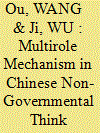

|
|
|
|
|
| Summary/Abstract |
This article uses the China Institute for Reform and Development (CIRD) in Hainan as a think tank case study of the multirole mechanism that has enabled it to operate effectively in formulating policy issues and influencing policies. This multirole mechanism is comparable to the “revolving door” in the United States but has a different structure and operation mode. This article ascribes these differences to the two countries’ contrasting political systems, polities and personnel systems, and highlights that the experiences of think tank operation are closely related to the political system background .
|
|
|
|
|
|
|
|
|
|
|
|
|
|
|
|
| 18 |
ID:
142224
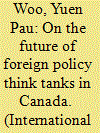

|
|
|
|
|
| Summary/Abstract |
Will foreign policy think tanks face the same fate as so many “old media” organizations? The average Canadian has better access to global news and analysis today through a handheld device than the expert analyst of 30 years ago working from published sources at a foreign policy think tank. Furthermore, the increasingly blurred boundaries between domestic and international issues have made the distinction between foreign policy and domestic policy less clear. Canadian foreign policy think tanks have to respond to these challenges, as well as to the broader problem of parochialism in Canadian society.
|
|
|
|
|
|
|
|
|
|
|
|
|
|
|
|
| 19 |
ID:
167691
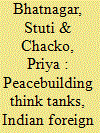

|
|
|
|
|
| Summary/Abstract |
Foreign policy making in India is typically viewed as highly centralised and dominated by the Prime Minister’s Office and bureaucracy. Yet in 2004, the Congress-Party-led United Progressive Alliance government launched a Composite Dialogue with Pakistan which included a place for Indian think tanks in the Kashmir dispute. We suggest that as India liberalised its economy amidst domestic political upheaval, think tanks were given greater access to domestic and foreign funding and adopted new roles in foreign policy making. In the case of the Kashmir conflict, peacebuilding think tanks were encouraged by the government to engage in cross-border activities that would build constituencies for peace with Pakistan and promote economic cooperation as an incentive for peace. While the government aimed to depoliticise the conflict, these think tanks used this opportunity to draw attention to marginalised perspectives and issues. Peacebuilding think tanks nonetheless faced significant challenges in shaping the peace process because of structural constraints regarding access to resources and lack of autonomy to further their agendas. This reflected resistance within the state to depoliticising a conflict that has long been India’s central national security issue.
|
|
|
|
|
|
|
|
|
|
|
|
|
|
|
|
| 20 |
ID:
186832
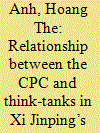

|
|
|
|
|
| Summary/Abstract |
This article reviews the ideology, guidelines, and policies of the Communist Party of China (CPC) on think-tanks and especially focuses on analysing Xi Jinping’s policies towards them since the 18th Party Congress in 2012. Observing both the CPC’s directives and the activities of some important think-tanks, this article finds that the relationship between the CPC and think-tanks in China has gotten increasingly closer. The closeness is reflected in indicators such as the CPC’s promulgation of the policy to build ‘a new type’ of think-tank, increasing reliance on and appreciation for the advice of think-tanks, funding for official think-tanks, and frequent emphasis on the absolute leadership of the CPC over them. This is a typical model of the corporatism between the CPC and the state, market and social organisation in China.
|
|
|
|
|
|
|
|
|
|
|
|
|
|
|
|
|
|
|
|
|